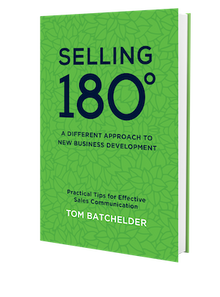Effective Language Dos and Don'ts
Words matter, especially when reaching out to people who don’t know us. When prospecting for new business, I recommend direct, genuine communication without the fluff. I believe excitement and meaningless fluff either scare people away or are just generally uninteresting. If we want to get busy people’s attentions, I advise that we make sure we sound like reasonable professionals with subject matter expertise and a non-pushy intent to see if we can be helpful. Sounds simple, right?
Most people have bad habits when prospecting via email, phone, LinkedIn InMail, or any other forms of outreach. There are a few specific words and ways of writing that I suggest you try to avoid when you or your team are prospecting. They aren’t necessarily fatal, but they definitely lead to lower response rates from ideal prospective clients and can put you quickly (and unnecessarily) in a chasing, ‘one-down’ position with prospects.
Here are a few simple yet significant style elements and phrases to avoid in targeted, cold prospecting:
1. “!”
When writing to those who don’t know you, exclamation points can scare people away. I get that you’re excited and have lots of energy but save it for a more appropriate moment. Your eagerness is understandable, but it isn’t very attractive early on.
2. “I look forward to hearing from you.”
This is an assumptive close that might have worked 30 years ago in the old school sales world with less sophisticated buyers and different social rules. If they don’t know you, don’t use this line. It’s lazy and not helpful. A simple replacement is something like, “Let me know if you’re open to a brief (10-minute) conversation. Either way, I wish you the best.”
3. “Please”
This is a begging word and doesn’t help you get a reply. It’s not a big deal to use the word “please,” but it’s also not helpful. “Please get back to me” isn’t going to increase your response rate and doesn’t make you seem like a respected professional. The aforementioned “Let me know…” is a good way to avoid saying “please” when prospecting.
4. “We CAN help you”
The word “can” is assumptive and may also scare people away. Even if you know you’ve helped others like your prospect and likely can help them, you don’t yet know who they are, what they’re open to, and if you’re a good fit for each other. Be disarming vs. overly assumptive by using phrases like, “…see if we might be able to help” or “…seems we might be a good fit.” The word “might” as opposed to “can” is disarming and gives the prospect a chance to lean in and ask to hear more.
Every word in your initial prospecting outreach matters. Choose the words and the tone / feeling behind them wisely. Slow down a bit and reflect on what types of sales messages, if any, you tend to respond to. Be thoughtful and conversational in your outreach. Appear as a reasonable, smart, interested-in-being-helpful type of person. It’s okay to be confident in what you do, but too much excitement, begging, or assumption isn’t compelling to new people who have a lot else on their plates.
Pick one of these linguistic bad habits to be more aware of and eliminate or change in an upcoming prospect message. Try something different. No matter how successful you already are in sales, there is always room for improvement.
Onward.
Tom
Let Milo write your sales emails. Try free for 7 days >>
Subscribe
Learn what to say and how to say it. Sales advice, free templates & more.
Learn what to say and how to say it. Sales advice, free templates & more.
© 2026 Selling 180.
Powered by Shopify

Buy The Book
The Selling 180° book teaches a new mindset and approach to selling and offers practical tips and scripts that you can immediately apply.



